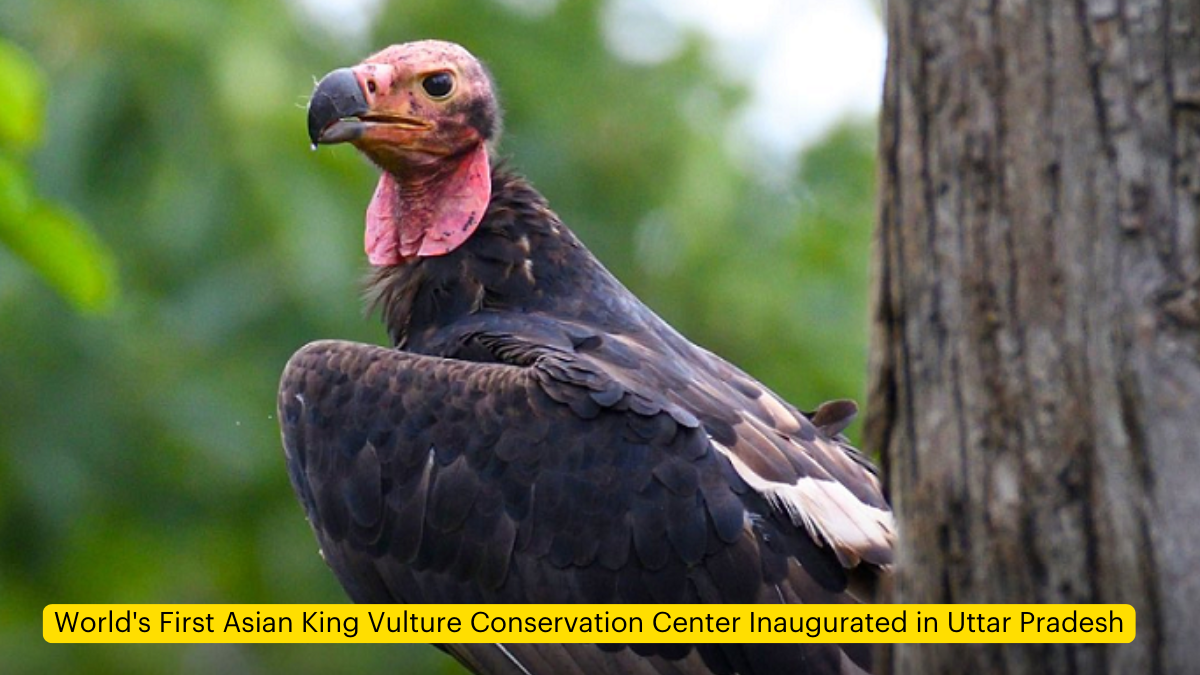On September 6, 2024, Uttar Pradesh Chief Minister Yogi Adityanath inaugurated the Jatayu Conservation and Breeding Centre in Bharivaisi, Campierganj Range of the Gorakhpur Forest Division. This groundbreaking facility marks a significant milestone in wildlife conservation as the world’s first dedicated conservation and breeding center for the Asian King Vulture, also known as the red-headed vulture.
A Unique Endeavor in Vulture Conservation
While other Jatayu conservation centers exist across India, catering to various vulture species, this new facility in Uttar Pradesh stands out for its exclusive focus on the Asian King Vulture. This specialization underscores the urgent need to protect this critically endangered species and highlights Uttar Pradesh’s commitment to biodiversity conservation.
The Jatayu Conservation and Breeding Centre: A Closer Look
Collaborative Effort and Strategic Location
The center is a result of collaboration between the Uttar Pradesh Forest Department and the renowned Bombay Natural History Society. Located in Maharajganj, the facility is strategically positioned within the Gorakhpur forest division, an area known for its diverse ecosystem.
State-of-the-Art Facilities
Spread over 1.5 hectares of land, the Jatayu Centre was constructed at a cost of Rs 2.8 crore. The facility boasts an array of specialized features designed to support the conservation and breeding of Asian King Vultures:
- Multiple bird cages for housing the vultures
- A dedicated nursery for juvenile birds
- A hospital and recovery facility for medical care
- A food processing center to ensure safe, uncontaminated food for the vultures
- An incubation center for artificial rearing of vulture eggs, aiming for 100% hatching success
Current Population and Future Goals
The center currently houses six king vultures – one male and five females. With an ambitious vision, the Jatayu Center aims to release 40 pairs of vultures into the wild over the next 8 to 10 years, significantly boosting the species’ population.
Understanding the Asian King Vulture
Scientific Profile
- Scientific Name: Sarcogyps calvus
- Primary Habitat: North India
- Conservation Status: Critically Endangered (IUCN Red List)
Unique Breeding Behavior
The Asian King Vulture exhibits monogamous behavior, forming lifelong partnerships. The female typically lays one egg per year, making population recovery a slow and delicate process.
Threats to Survival
The species faces numerous threats, including:
- Habitat loss due to human encroachment and deforestation
- Poisoning from diclofenac, a non-steroidal anti-inflammatory drug used in livestock
- Head/neck drooping syndrome caused by consuming contaminated carcasses
Conservation Strategies at the Jatayu Centre
Controlled Breeding and Release Program
The center has developed a careful strategy to increase the vulture population:
- Captive birds will be released into the wild after the female lays an egg
- The egg will be artificially incubated in a controlled environment
- This approach aims to maximize breeding success while maintaining a wild population
Safe Feeding Initiative
To combat the threat of diclofenac poisoning, the center has installed a food processing facility. This ensures that the vultures are provided with uncontaminated meat, significantly reducing the risk of poisoning and subsequent mortality.
Broader Conservation Efforts in Uttar Pradesh
During the inauguration ceremony, Chief Minister Yogi Adityanath demonstrated the state’s commitment to environmental education and conservation by instructing the Forest Department to establish a forestry college in Gorakhpur. This initiative aims to foster expertise in forest management and wildlife conservation, complementing the work of the Jatayu Centre.




 Rajasthan Budget 2026–27 Presented with ...
Rajasthan Budget 2026–27 Presented with ...
 Uttar Pradesh Tables First-Ever Economic...
Uttar Pradesh Tables First-Ever Economic...
 Uttar Pradesh Presents ₹9.13 Trillion Bu...
Uttar Pradesh Presents ₹9.13 Trillion Bu...








